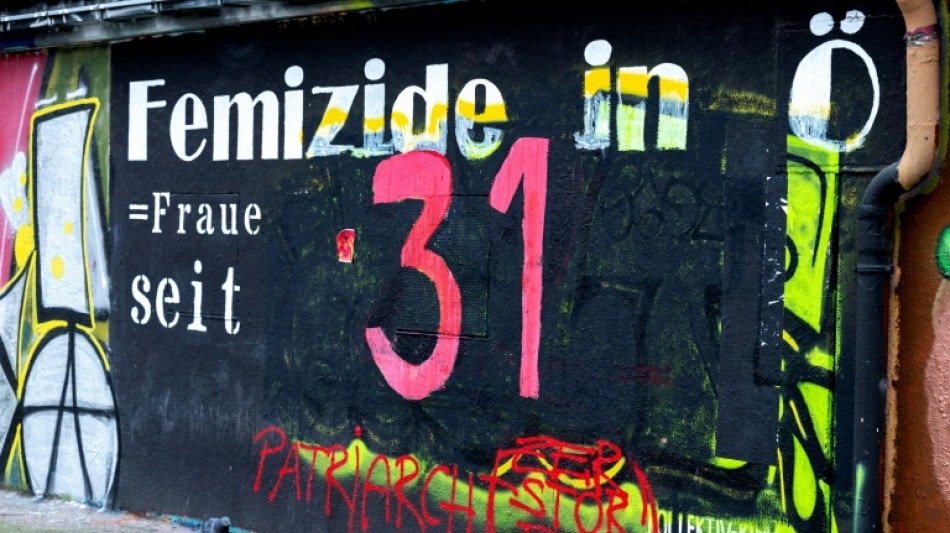
-
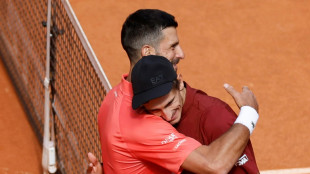 Djokovic crashes to nervous Arnaldi in Madrid opener
Djokovic crashes to nervous Arnaldi in Madrid opener
-
Syria's Kurds demand 'democratic decentralised' Syria
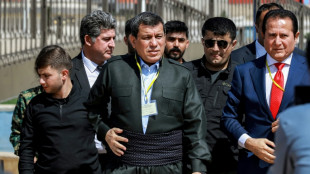
-
 Leverkusen win to delay Bayern and Kane's title party
Leverkusen win to delay Bayern and Kane's title party
-
Buenos Aires farewells native pontiff with tears and calls to action
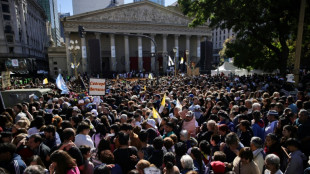
-
 Turkey's opposition says Erdogan's canal plan behind latest arrests
Turkey's opposition says Erdogan's canal plan behind latest arrests
-
Maresca hails 'nasty' Chelsea as top five bid stays alive

-
 Trump raises Putin doubts after Zelensky talks at pope's funeral
Trump raises Putin doubts after Zelensky talks at pope's funeral
-
Major blast at Iran port kills 4, injures hundreds

-
 Napoleon's sword to be sold at auction in Paris
Napoleon's sword to be sold at auction in Paris
-
Iran, US discuss nuclear deal in third round of talks

-
 Buenos Aires farewells native pontiff with call to action
Buenos Aires farewells native pontiff with call to action
-
Warholm sets hurdles world record at Diamond League, Holloway shocked

-
 US students 'race' sperm in reproductive health stunt
US students 'race' sperm in reproductive health stunt
-
Wikileaks founder Assange joins crowds for pope funeral

-
 Leader Marc Marquez claims Spanish MotoGP sprint victory
Leader Marc Marquez claims Spanish MotoGP sprint victory
-
Celtic win fourth successive Scottish Premiership title

-
 Jackson ends drought as Chelsea boost top five push
Jackson ends drought as Chelsea boost top five push
-
Warholm sets 300m hurdles world record in Diamond League opener

-
 Major blast at south Iran port kills 4, injures hundreds
Major blast at south Iran port kills 4, injures hundreds
-
Russia says retook Kursk from Ukraine with North Korean help

-
 Francis laid to rest as 400,000 mourn pope 'with an open heart'
Francis laid to rest as 400,000 mourn pope 'with an open heart'
-
Trump, Zelensky meet on sidelines of pope's funeral

-
 'Shared loss': Filipino Catholics bid Pope Francis farewell
'Shared loss': Filipino Catholics bid Pope Francis farewell
-
Families unable to reunite as India-Pakistan border slams shut
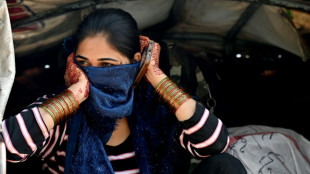
-
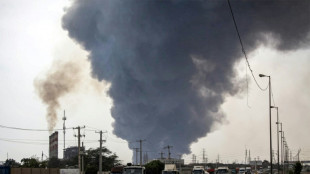 Major blast at south Iran port injures hundreds
Major blast at south Iran port injures hundreds
-
Foreign carmakers strive for 'China Speed' to stay in race
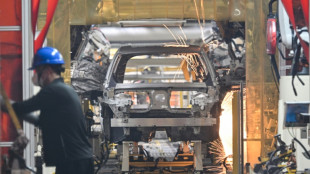
-
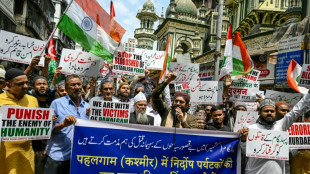 Pakistan says open to neutral probe into Kashmir attack after India threats
Pakistan says open to neutral probe into Kashmir attack after India threats
-
Hundreds of thousands at funeral mourn pope 'with an open heart'
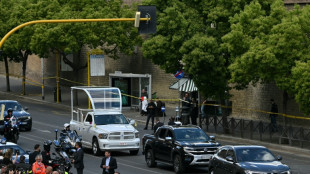
-
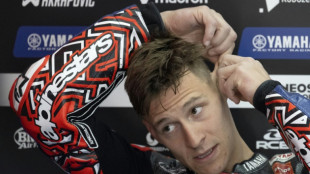 Quartararo sets Spanish MotoGP record to claim pole
Quartararo sets Spanish MotoGP record to claim pole
-
Hamas says open to 5-year Gaza truce, one-time hostages release
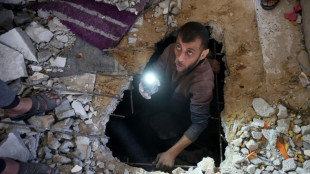
-
 Iran, US hold new round of high-stakes nuclear talks
Iran, US hold new round of high-stakes nuclear talks
-
Up at dawn for front-row seat to history at Francis's funeral

-
 Pakistan ready to 'defend sovereignty' after India threats
Pakistan ready to 'defend sovereignty' after India threats
-
Huge crowds flock to Vatican for Pope Francis's funeral

-
 Xi says China must 'overcome' AI chip challenges
Xi says China must 'overcome' AI chip challenges
-
Indian army says new exchange of gunfire with Pakistan

-
 Epstein accuser Virginia Giuffre takes own life in Australia: family
Epstein accuser Virginia Giuffre takes own life in Australia: family
-
Hundreds of buildings damaged, dozens injured in 6.3 Ecuador quake

-
 India and Pakistan's Kashmir fallout hits economy too
India and Pakistan's Kashmir fallout hits economy too
-
Francis's funeral to be grand farewell to 'pope of the poor'

-
 Pogacar faces defiant Evenepoel at Liege-Bastogne-Liege
Pogacar faces defiant Evenepoel at Liege-Bastogne-Liege
-
Chelsea eye great escape against Barcelona in Women's Champions League

-
 Iran, US to hold new round of high-level nuclear talks
Iran, US to hold new round of high-level nuclear talks
-
'Energy and effort' pay off for Reds as Blues' woes continue

-
 Albatross and closing birdie lift China's Liu to LPGA Chevron lead
Albatross and closing birdie lift China's Liu to LPGA Chevron lead
-
On the horizon? Wave of momentum for high seas treaty

-
 New to The Street Launches For The Causes(TM) Monthly Awareness Segments: Offering Free National Media to Charities and Organizations
New to The Street Launches For The Causes(TM) Monthly Awareness Segments: Offering Free National Media to Charities and Organizations
-
Top Mistakes to Avoid When Building Credit History

-
 Developing countries should fast-track US trade deals: World Bank president
Developing countries should fast-track US trade deals: World Bank president
-
Grizzlies' Morant 'doubtful' for must-win game 4 v Thunder


Austria raises alarm about 'dramatic' femicide plague
Painted in blood red on an improvised memorial in Vienna, the number 31 is a stark reminder of a grim toll: the women killed by men in Austria last year.
After several particularly horrific cases among the killings were widely reported in the media, the issue of femicide is now squarely under the spotlight.
In a small, wealthy country where violent crime generally is rare, a public debate has begun, galvanising activists and forcing politicians to act.
"It's a really dramatic situation... It's incomprehensible," Maria Roesslhumer, executive director of a network of women's shelters, told AFP.
Figures have fluctuated over the years, but between 2010 and 2020, 319 women were killed in Austria, mostly by their male partners or ex-partners, with a record high of 43 victims in 2019, according to a study commissioned by the government last year.
In 2018, Austria was among the three European Union members to report the highest rates of femicide where the perpetrator was a family member or relative, Eurostat data showed.
However, activist Ana Badhofer still decries a "lack of outrage" over femicide, saying her group instigated the memorial at a Vienna market out of frustration.
She cited an example from November of a woman beaten to death with a baseball bat.
It was a particularly shocking case last March that forced the issue to the forefront.
A 35-year-old woman, identified only as Nadine W., was beaten and strangled with a cable in a Vienna tobacco store by her 47-year-old ex-partner.
He then poured gasoline on her and set her alight before leaving the shop and locking the door.
She was rescued but died a month later from her horrific injuries.
In April, the 43-year-old owner of a craft beer store -- previously accused by a politician of harassing her with obscene messages -- was arrested for killing his former partner, a 35-year-old mother of two.
Both men were given life sentences and sent to institutions for mentally disturbed offenders.
-'Shame and stigma'-
From France to Mexico, South Africa to Turkey, campaigners have sounded the alarm about femicide and violence against women, often through massive rallies.
In Austria, the coalition government recently allocated 25 million euros ($28 million) this year, among several initiatives towards fighting the problem.
The killings have prompted some soul-searching in the Alpine country, where more women than men are killed, according to Eurostat figures, making it an outlier in the EU.
Roesslhumer pointed to a "tangible societal disrespect and disdain of women" which needed to be tackled.
Karin Pfolz has bitter firsthand experience of such attitudes.
During the decade in which she was stuck in an abusive marriage, she frequently felt isolated, she told AFP.
"You don't have anyone you can talk to, because there is so much shame and social stigma," said Pfolz, who now speaks about her experiences in schools.
Criminologist Isabel Haider, of the University of Vienna, said that law enforcement officers also needed to be trained to respond more sensitively, as many women feel "police aren't taking them seriously".
It was a fear of not being believed that kept Pfolz from reaching out to the police.
When she did eventually take her husband to court, she said that the -- female -- judge's attitude reinforced the sense she wasn't believed.
- 'Refugee in your own country'-
The Council of Europe's human rights commissioner Dunja Mijatovic, on a recent visit to Austria, called for "an ambitious and comprehensive approach" to "protect women's rights and gender equality".
She noted the Austrian gender pay gap -- just under 20 percent in 2019, according to Eurostat -- is among the widest in the EU.
"When you leave, all you've got is a plastic bag in one hand and a child in the other," Pfolz said.
"You become a refugee in your own country," she added.
But Pfolz knows that even when women are in the process of building a new life, they often still face threats from former partners.
Her ex-husband would come to her new house and she remembered having to "lock myself into a room with my son because our lives were at risk".
While she recognises that the issue of violence against women is now higher up the agenda, Pfolz still laments that "almost nobody even considers this a crime -- until it turns to murder".
This year was only a few days old before another shocking case hit the headlines -- a 42-year-old woman shot in the head and killed by her husband at their dinner table.
M.Thompson--AMWN